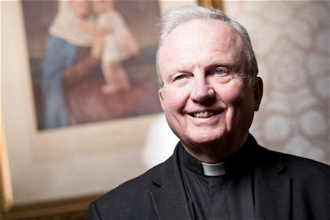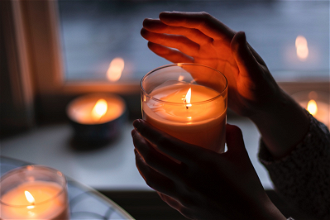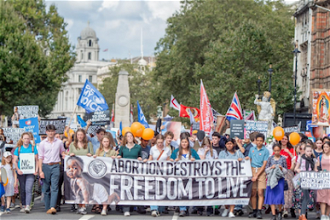Ireland: prayer vigils, protests after woman dies following miscarriage

Thousands of people have attended candle-lit vigils and demonstrations across Ireland and in London, in memory of a young Indian woman who died after going into premature labour when she was 17 weeks pregnant and suffering a miscarriage.
The husband of Savita Halappanavar, 31, said he repeatedly asked staff at University College Hospital Galway, to give his wife an abortion as he thought the baby was not going to survive and he was concerned for the safety of his wife. Irish police have confirmed they are assisting the coroner in relation to Mrs Halappanavar's death. A police spokesperson said this was "standard procedure in the case of a sudden death".
In Galway, up to 1,000 people took part in a vigil in Eyre Square in the centre of the city while separately, about 60 members of the Indian community gathered outside the hospital and held two minutes of silent prayer. Smaller demonstrations were also held Ennis, Clonakility, Kilkenny, Sligo, Limerick, Carlow and Letterkenny.
The cause of Mrs Halappanavar's death was septicaemia, according to an autopsy carried out two days after her death. She had been admitted to the hospital with severe back pain and was later told she was having a miscarriage.
Her husband, Praveen Halappanavar, said his wife had accepted she was losing her baby and made several requests for a medical termination. However, he claimed that doctors refused her plea because there was a foetal heartbeat. Mr Halappanavar said hospital staff told them Ireland was "a Catholic country".
The hospital authorities have said the facts of the case have yet to be established. They are co-operating with two investigations into her death - an internal investigation and an inquiry carried out by the Irish Health Service Executive (HSE).
A spokesman for the Thomas More Legal Centre said in a statement: " we certainly do not know whether the Irish abortion laws have the slightest relevance to her death. Even had she been given an abortion immediately she asked for it it might not have made the slightest difference to her death, we simply do not know. She may have had a pre-existing condition she may not have been given the correct antibiotics or she may have been given the best possible care by doctors and nurses who did everything humanly possible to save and who followed all the established medical guidelines and procedures.
"The only comment I have heard so far stating that an abortion would have saved her life is from her husband who is undoubtedly still in a state of shock and who is also not medically qualified.
Writing in the Indian newspaper 'The Hindu', gynaecologist Hema Divakar, president-elect of the Federation of Obstetric and Gynaecological Societies of India (FOGSI) for 2013-2014, defends the Irish doctors for not aborting Savita’s foetus saying that under the circumstances, it may have been equally dangerous to have performed an abortion
"Gynaecologist Hema Divakar defended the Irish doctors for not aborting Savita’s foetus saying: “Based on information in the media, in that situation of septicaemia, if the doctors had meddled with the live baby, Savita would have died two days earlier.”
Delay or refusal to terminate the pregnancy does not in itself seem to be the cause of death. Even if the law permitted it, it is not as if her life would have been saved because of termination,” she said. “Severe septicaemia with disseminated intravascular coagulation (DIC), a life-threatening bleeding disorder which is a complication of sepsis, major organ damage and loss of the mother’s blood due to severe infection, is the cause of death in Savita’s case. This is what seems to have happened and this is a sequence which cannot be reversed just by terminating the pregnancy.”
“Based on available information, Savita would have reported pain and infection and doctors would have indicated a miscarriage as the 17-week foetus may not have grown as expected. Its growth would have been deteriorating because of the infection. Having understood that the baby was not going to make it, the couple would have asked for termination. But as Savita’s infection may have required aggressive treatment at that stage, doctors must have felt the need to prevent complications. The usual [practice] is to meddle the least till the mother is stable.”
Asserting that it is wise to wait in cases with such complications at 17 weeks, Dr Divakar said: “As per reports, the baby’s heartbeat stopped after three days. But that was expected.”
She added: ".. according to the World Health Organisation Ireland has one of the lowest Maternal Mortality Rates in the world routinely coming in the top five or six countries and ahead of Britain so the facts would seem to show that women's lives are at less risk in Ireland than they are in other countries."
At the conclusion of the meeting of the Standing Committee of the Irish Catholic Bishops’ Conference on the equal and inalienable right to life of a mother and her unborn child today at Saint Patrick’s College, Maynooth, the following statement was issued:
"The death of Mrs Savita Halappanavar and her unborn child in University Hospital Galway on the 28 October last was a devastating personal tragedy for her husband and family. It has stunned our country. We share the anguish and sorrow expressed by so many at the tragic loss of a mother and her baby in these circumstances and we express our sympathy to the family of Mrs Halappanavar and all those affected by these events.
"In light of the widespread discussion following the tragic death of Mrs Halappanavar and her unborn baby, we wish to reaffirm some aspects of Catholic moral teaching. These were set out in our recently published Day for Life message on 7 October last, available on www.chooselife2012.ie
· The Catholic Church has never taught that the life of a child in the womb should be preferred to that of a mother. By virtue of their common humanity a mother and her unborn baby are both sacred with an equal right to life.
· Where a seriously ill pregnant woman needs medical treatment which may put the life of her baby at risk, such treatments are ethically permissible provided every effort has been made to save the life of both the mother and her baby.
· Whereas abortion is the direct and intentional destruction of an unborn baby and is gravely immoral in all circumstances, this is different from medical treatments which do not directly and intentionally seek to end the life of the unborn baby. Current law and medical guidelines in Ireland allow nurses and doctors in Irish hospitals to apply this vital distinction in practice while upholding the equal right to life of both a mother and her unborn baby.
· Some would claim that the unborn baby is less human or less deserving of life. Advances in genetics and technology make it clear that at fertilisation a new, unique and genetically complete human being comes into existence. From that moment onwards each of us did not grow and develop into a human being, but grew and developed as a human being.
With many other religious and ethical traditions we believe in upholding the equal and inalienable right to life of a mother and her unborn child in our laws and medical practice. This helps to ensure that women and babies receive the highest standard of care and protection during pregnancy. Indeed, international statistics confirm that Ireland, without abortion, remains one of the safest countries in the world in which to be pregnant and to give birth. This is a position that should continue to be cherished and strengthened in the interests of mothers and unborn children in Ireland.
Source: Irish Catholic Media Office/Thomas More Centre/BBC





















